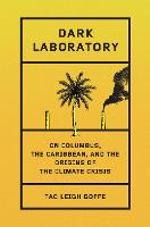In 1492, Christopher Columbus arrived on the Caribbean Island of Guanahani to find an Edenic scene that was soon mythologized. But behind the myth of paradise, the Caribbean and its people would come to pay the price of relentless Western exploitation and abuse. In Dark Laboratory, Dr. Tao Leigh Goffe embarks on a historical journey to chart the forces that have shaped these islands: the legacy of slavery, indentured labor, and the forced toil of Chinese and enslaved Black people who mined the islands’ bounty-including guano, which, at the time, was more valuable than gold-for the benefit of European powers and at the expense of the islands’ sacred ecologies. Braiding together family history, cultural reportage, and social studies, Goffe radically transforms how we conceive of Blackness, the natural world, colonialism, and the climate crisis; and, in doing so, she deftly dismantles the many layers of entrenched imperialist thinking that shroud our established understanding of the human and environmental conditions to reveal the cause and effect of a global catastrophe. Dark Laboratory forces a reckoning with the received forms of knowledge that have led us astray. Through the lens of the Caribbean, both guide and warning of the man-made disasters that continue to plague our world, Goffe closely situates the origins of racism and climate catastrophe within a colonial context. And in redressing these twin apocalypses, Dark Laboratory becomes a record of the violence that continues to shape the Caribbean today. But it is also a declaration of hope, offering solutions toward a better future based on knowledge gleaned from island ecosystems, and an impassioned, urgent testament to the human capacity for change and renewal.

Dark laboratory : on Columbus, the Caribbean, and the origins of the climate crisis
ISBN: 9780385549912
Format: Hardback
Publisher: Knopf Doubleday
Origin: US
Release Date: January, 2025


